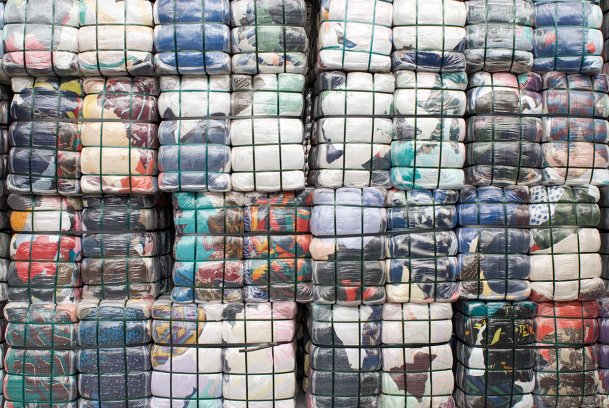
UK textile recycling sector under threat
Warehouses are becoming overwhelmed, increasing the risk of more textile waste being incinerated.

28th October 2024
Innovation in Textiles
|
Europe
Following the filing of Soex for bankruptcy earlier this month, the European Recycling Industries’ Confederation (EuRIC) and Municipal Waste Europe (MWE), both based in Brussels, have released a joint statement warning of an unprecedented crisis for Europe’s textile sorting and recycling industry.
The sector is under immense pressure it warns, due to several global disruptions, including the war in Ukraine, logistical challenges in Africa and the rise of ultra-fast fashion.
As a result, there is an oversupply of used textiles and a sharp decline in demand from traditional export markets. The trade in used textiles between the EU and non-EU countries fell from 464,993 tons in 2022 to 430,185 tons in 2023.
Prices for second-hand textiles have plummeted, while the costs of collection, sorting and recycling have skyrocketed
Looking at Germany alone, the exports of used textiles to Ghana – one of Europe’s key export markets – have fallem from 7,911 tons in 2020 to 4,533 tons in 2023. Additionally, demand for recycled materials remains low – recycled cotton had an estimated production volume of 319,000 tons in 2023 compared to the production of 24.4 million tons of virgin cotton globally.
Consequently, prices for second-hand textiles have plummeted, while the costs of collection, sorting, and recycling have skyrocketed.
Since Spring 2024, the prices for sorted second-hand garments no longer cover processing costs, leading to major cash flow problems for sorting operators. Warehouses are becoming overwhelmed, increasing the risk of textile waste being incinerated.
EuRIC and MWE are consequently calling on the EU to encourage member states to lower VAT on textile repair, reuse and recycling activities within the existing VAT Directive framework, and to explore the possibility of introducing a tax on new, oil-based materials.
Such measures, if adopted at national levels, would incentivise the use of recycled materials and reduce the environmental impact of virgin textile production.
“This situation is likely to raise processing costs for municipalities, potentially resulting in higher waste disposal fees for residents, with the fear that the textiles will be thrown in the residual waste instead,” the statement notes. “Downstream players in the recycling chain, such as tearing and spinning mills, are also feeling the strain, leading to significant staff cuts.
“To avert widespread bankruptcies, immediate financial and legislative support is essential. Short-term financial incentives for EU companies that contribute significantly to a sustainable circular textile chain are needed to safeguard the industry from collapsing. Investment in recycling technologies and infrastructure, alongside targeted support for municipalities dealing with textile waste stagnation, is crucial.”
The organisations are further urging the EU to facilitate public-private partnerships to foster innovation in textile recycling and to scale up recycling technologies. This will help increase Europe’s capacity to process textile waste sustainably and efficiently. A swift revision of the Waste Framework Directive (WFD) and rapid implementation of Extended Producer Responsibility (EPR) schemes are also seen as imperative.
In the mid-term, efforts should focus on making the textiles reuse and recycling sector competitive, in line with EC president Ursula Von der Leyen’s ambition for a competitive and strong circular economy.
“To reach this ambition, the EU needs to increase demand for recycled textiles, expand recycling capacity and promote the use of sustainable materials through upcoming ecodesign requirements,” the statement concludes. “We call for the mandatory inclusion of a percentage of recycled textile content – most preferably from post-consumer textiles – in all new textile products placed on the EU market, with a clear trajectory for increasing this percentage over the coming years. Without urgent action, Europe risks undermining its climate goals and jeopardising the future of its textile sorting and recycling industry.”

Business intelligence for the fibre, textiles and apparel industries: technologies, innovations, markets, investments, trade policy, sourcing, strategy...
Find out more